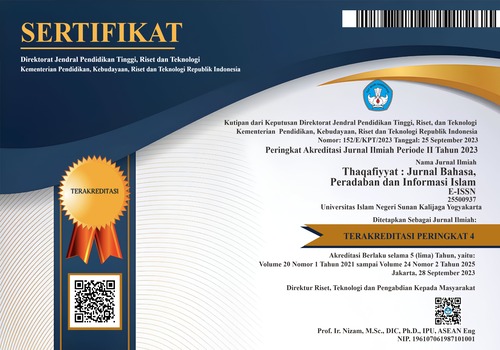PERKEMBANGAN DAN PENGARUH PEMIKIRAN TEOLOGI MU‘TAZILAH TENTANG KEMAKHLUKAN AL-QUR’ĀN TAHUN 124-218 H/742-838 M
DOI:
https://doi.org/10.14421/thaq.2015.%25xAbstract
This paper examines the development and influence of the thought
of the created al-Qur’ān of the Mu’tazilite theology years 124-218 AH / 742- 833 AD. The thougth of the created al-Qur’ān that occurred for the first time appeared during the Umayyad Daulah, gaining momentum of its development when received and distributed by the Mu’tazilite. This occurs because the close relations between the Mu’tazilite and the Caliph al-Mamun. The linkage between religious thought and government impact on the government’s strong support in spreading thought of the created al-Qur’ān. It is characterized by ideologization of the thought of the created al-Qur’ān officially by the state to the scholars and judges who were under the power Daula Abbasid, by running of the Miẖnah policy in 218 AH / 838 AD. After the year 218 AH / 838 AD, the influence of thought of the created al-Qur’ān is still quite strong both in the social, politic and culture.
Keywords: al-Ma’mūn, Mu‘tazilite, the created al-Qur’ān, Miẖnah
Downloads
Downloads
Published
Issue
Section
License
Authors who will publish with this journal agree to the following terms:
- Thaqafiyyat: Jurnal Bahasa, Peradaban dan Informasi Islam publishes all articles entirely in full text.
- It is permissible for readers to download and to use it for scientific purposes and scientific dissemination.
- Authors retain copyright and grant the journal right of first publication with the work simultaneously licensed under a Creative Commons Attribution License that allows others to share the work with an acknowledgement of the work's authorship and initial publication in this journal.
- Authors are able to enter into separate, additional contractual arrangements for the non-exclusive distribution of the journal's published version of the work (e.g., post it to an institutional repository or publish it in a book), with an acknowledgement of its initial publication in this journal.
- Authors are permitted and encouraged to post their work online (e.g., in institutional repositories or on their website) prior to and during the submission process, as it can lead to productive exchanges, as well as earlier and greater citation of published work.










